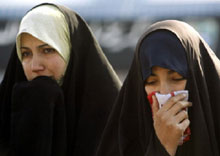|
Election Campaigns Find No Room in Sadr City
 |
|
Sadr
enjoys the support of the majority of Sadr City residents
|
By
Samir Haddad, IOL Correspondent
BAGHDAD,
December 16 (IslamOnline.net) – Although campaigning for the Iraqi
general elections, scheduled for January, officially west under way on
Thursday, December 16, the Baghdad district of Sadr City featured no
posters or signs of the fast-approaching vote.
“We
are not taking part in the voting or even the election campaign in
compliance with Shiite leader Muqtada Al-Sadr’s boycott calls,”
Hashem Kazem Al-Karkad, 57, told IslamOnline.net’s correspondent.
“There
would never be free and fair elections under occupation,” he said
echoing the position of the anti-occupation young Shiite leader, who
enjoys the support of the majority of the district’s 2.5-million
population.
Protesting
the continued US-led occupation of Iraq, firebrand Sadr has called
for boycotting the general elections.
He
reportedly refused to join the United Iraqi Alliance, a unified
list of 228 candidates formed by Iraq’s major Shiite groups
and endorsed by Grand Ayatollah Ali Al-Sistani, the country’s
highest Shiite religious.
Sadr
emerged as the man who defended the holiest site in Shiite Islam, in
the city of Najaf, against the formidable military might of the United
States.
But
in August, he ordered
his fighters to disarm and leave the shrine as part of a deal reached
after weeks of fierce clashes with US occupation forces.
Family
Killers
 |
|
Some
Iraqis linked the election boycott to the killing of relatives by
US government forces
|
The
havoc wreaked on the mainly Shiite neighborhood during a US-led
onslaught and the killing of many loved ones by the occupation forces
also contributed to the election apathy.
“Myself
and my five sons are boycotting the elections to protest the death of
my son, who was killed by the government of (interim prime minister
Ayad) Allawi,” said Umm Fadel.
“They
killed my son. How can we elect them?”
Abdel
Zahra Aqel, 70, also had a similar heartbreaking story.
“Allawi’s
government killed my two sons, I would not be part of this process,”
he said.
Umm
Ali, another mother, accused the interim government and the US forces
of burning down her home.
Sadr’s
Mahdi Army fighters in City district agreed on Saturday, October 9, to
disarm
and stop attacks against US occupation forces under a deal
reached with the interim government.
Fighting
erupted at the beginning of April in Sadr City, leaving at least 1,000
people killed and the district’s infra-structure devastated.
Campaigning
Elsewhere
In
other Shiite majority neighborhoods of Baghdad, election posters and
signs carrying fatwas from Sistani urging Iraqis to take part in the
elections are everywhere.
The
scene is completely different in the Sunni neighborhoods where similar
signs encourage boycotting the elections.
The
Association of Muslim Scholars (AMS), the highest Sunni religious
authority in the country, called
for a boycott of the vote, citing the impossibility of
organizing fair elections held under current deteriorating conditions.
However,
the Islamic Party, a major Sunni political player, and other smaller
groups have signaled readiness to vie in the elections to choose a
275-member assembly that will write a permanent constitution.
This
difference leaves most Sunnis caught in the dilemma of to vote
or not to vote.
A
total of some 6,400 candidates on around 100 lists have been
registered for the elections, according to final figures released
Thursday.
The
Sistani-endorsed United Iraqi Alliance includes the Supreme Council
for the Islamic Revolution, the Islamic Dawa Party and the Iraqi
National Congress, led by one-time Pentagon favorite Ahmad Chalabi.
The
Patriotic Union of Kurdistan (PUK), the Kurdistan Democratic Party
(KDP) and the Islamic party of Kurdistan also have a unified slate for
the vote.
The
Iraqi list, headed by Allawi, includes 233 candidates, while interim
president Ghazi Al-Yawar leads a 80-candidate list.
Iraqis
will choose a 275-member assembly that will write a permanent
constitution.
If
adopted in a referendum next year, the constitution would form the
legal basis for another general election to be held by December, 2005.
Under
an election law adopted this year, there will be no electoral
boundaries for the January vote, with the entire country treated as a
single constituency.
|